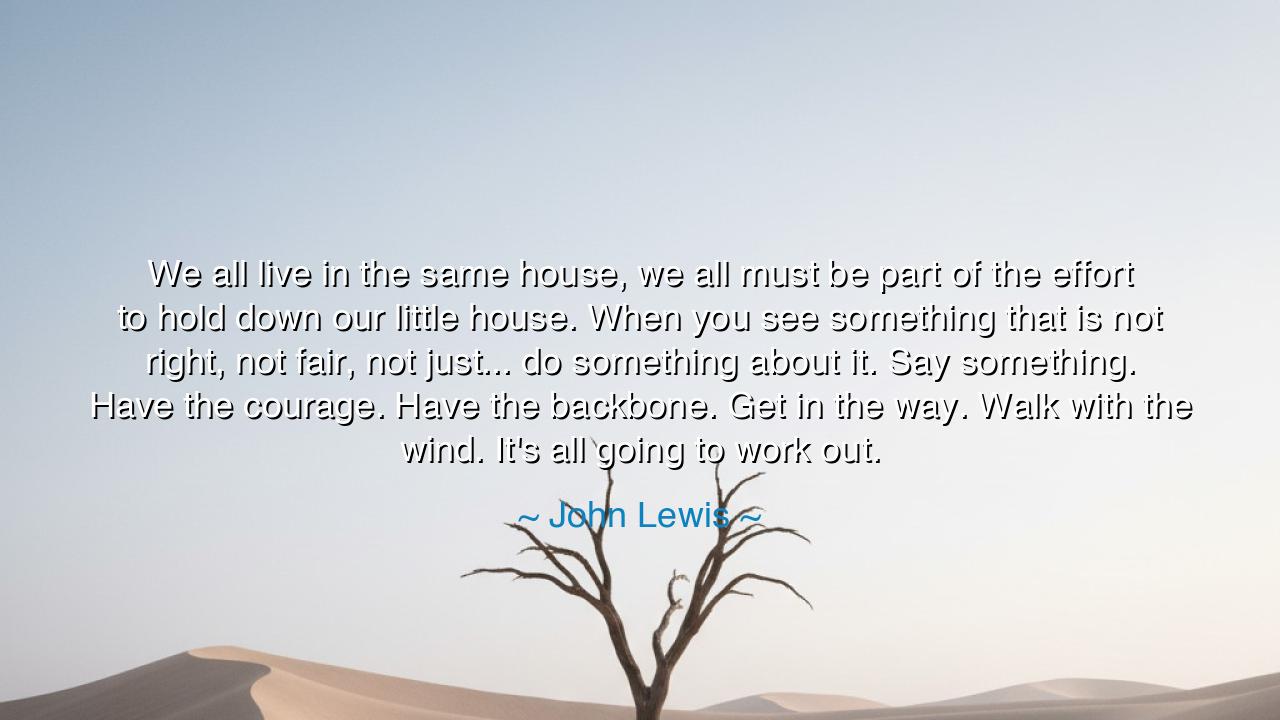
We all live in the same house, we all must be part of the effort
We all live in the same house, we all must be part of the effort to hold down our little house. When you see something that is not right, not fair, not just... do something about it. Say something. Have the courage. Have the backbone. Get in the way. Walk with the wind. It's all going to work out.






"We all live in the same house, we all must be part of the effort to hold down our little house. When you see something that is not right, not fair, not just... do something about it. Say something. Have the courage. Have the backbone. Get in the way. Walk with the wind. It's all going to work out." Thus spoke John Lewis, the great civil rights warrior, whose life was a living testament to the power of courage, justice, and love in action. These words, forged in the fire of struggle and tempered by hope, carry the weight of generations who have suffered, risen, and believed in the better angels of our shared humanity. He speaks not merely of protest, but of moral duty—a sacred calling to protect the fragile house of civilization in which we all dwell.
In this quote, Lewis envisions humanity as a single house, bound together by fate and responsibility. The walls of this house are built from compassion, the roof from justice, and its foundation from truth. To neglect it is to let the winds of hatred and division tear it apart; to defend it is to affirm our shared destiny. When Lewis says, “do something about it, say something,” he calls forth the ancient law of the conscience—that silence in the face of wrong is itself a form of betrayal. He reminds us that justice is not maintained by the powerful, but by the brave, those who refuse to look away when evil stirs in their midst.
The origin of these words springs from Lewis’s own life of fearless service. As a young man, he stood at the front lines of the American civil rights movement. On March 7, 1965, at the Edmund Pettus Bridge in Selma, Alabama, he led peaceful marchers in their demand for voting rights. What met them was brutality—clubs, whips, and the bitter cruelty of injustice. Lewis’s skull was fractured, his body bloodied. Yet he did not curse his oppressors, nor did he retreat from his cause. Instead, he rose with even greater faith. For he believed, as he later said, that “the truth is marching on.” From his suffering emerged the moral courage that would echo through the decades, shaping his lifelong message: “Get in the way. Make good trouble.”
Lewis’s “walk with the wind” is a poetic command—a call to move with the current of righteousness, even when the storm rages. To “walk with the wind” is to trust that when we act from conscience and love, we are carried by a greater force—the force of moral truth that moves through history like a mighty tide. This idea has roots in the wisdom of the ancients and the teachings of prophets: that justice is not an act of power, but of harmony with the divine order. The one who walks with the wind does not fight for himself alone; he fights for the soul of the whole human house.
Through this quote, John Lewis also teaches that courage is not merely physical bravery, but spiritual steadfastness. To “have the backbone” is to stand firm when others bend to fear or indifference. To “get in the way” is to disrupt injustice—not with hatred, but with truth so powerful that it shakes the walls of oppression. History’s greatest lights—Mahatma Gandhi, Martin Luther King Jr., Nelson Mandela—all walked this same path. They too lived by the conviction that peace without justice is fragile and that love without action is hollow. Their lives, like Lewis’s, remind us that the health of our common house depends on the strength of those willing to defend it.
His final words—“It’s all going to work out”—are not naïve optimism but the wisdom of a man who has seen the world at its darkest and still believes in the dawn. Lewis knew that despair is the ally of tyranny, while hope is the engine of progress. His faith was not in systems or rulers, but in the enduring capacity of ordinary people to rise, to speak, to change the course of history with compassion and persistence.
So, my children of tomorrow, remember this teaching: our world is one house, fragile yet full of promise. Each of us is both builder and guardian. When you witness injustice—whether in your community, your nation, or your own heart—do something about it. Speak when silence tempts you. Stand when fear says to sit. Have the courage to disturb the peace of wrong, and walk with the wind of right. It may be hard, but it will always be worth it.
For as John Lewis taught through his life and his words, the work of justice is the work of love in motion. If we all labor to hold up this house together—with compassion as our mortar and truth as our beam—then even through storms and darkness, the house of humanity will stand. And in the end, yes—it will all work out, for love, once set in motion, cannot be undone.






AAdministratorAdministrator
Welcome, honored guests. Please leave a comment, we will respond soon